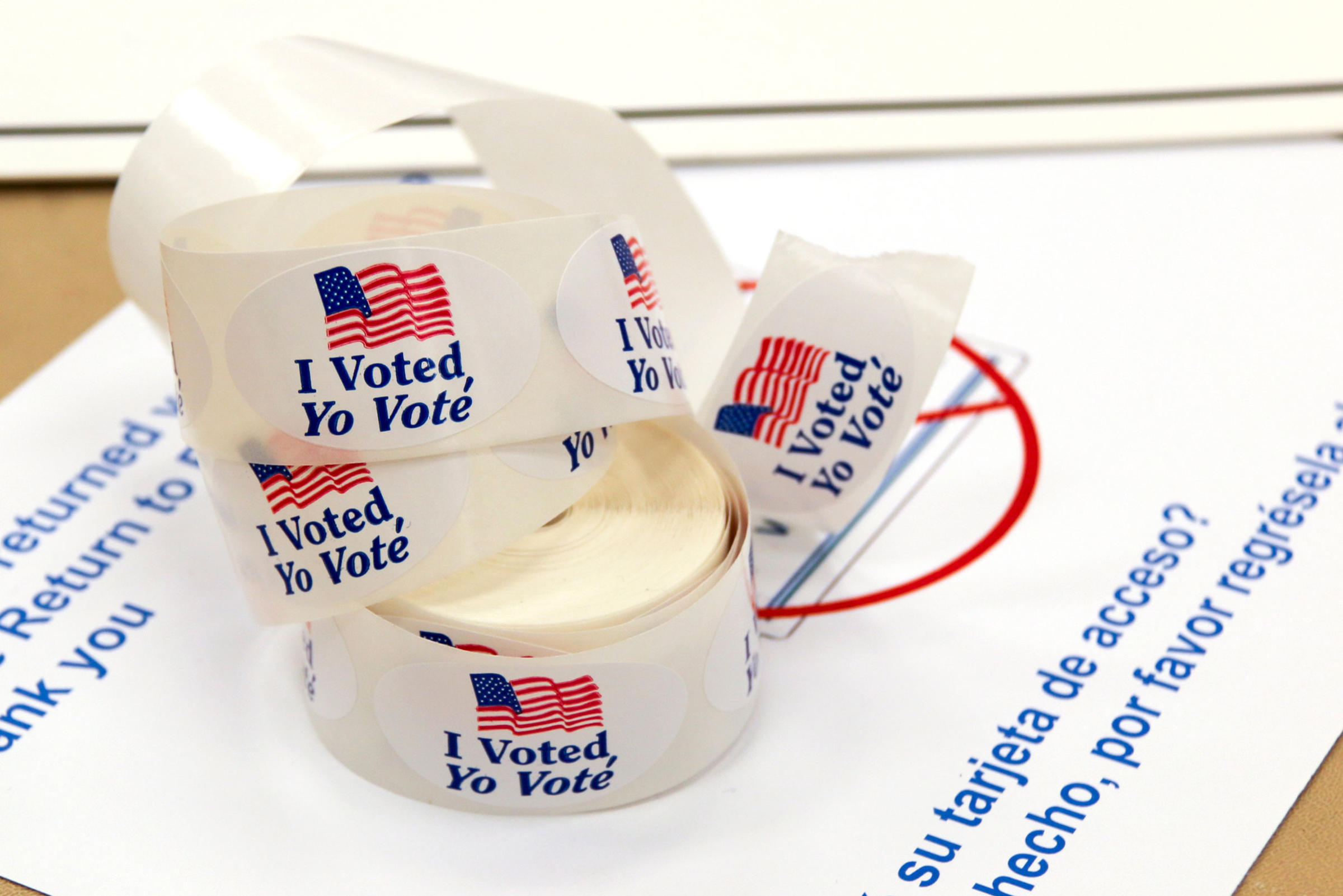Ballot Collection Laws and Litigation
Third-party ballot collection—sometimes contemptuously called “ballot harvesting”—has drawn fierce partisan debate this election season. What laws currently govern ballot collection?

Published by The Lawfare Institute
in Cooperation With

Lawfare is partnering with the Stanford-MIT Healthy Elections Project to produce a series on election integrity in the midst of the coronavirus crisis. The Healthy Elections Project aims to assist election officials and the public as the nation confronts the challenges that the coronavirus pandemic poses for election administration. Through student-driven research, tool development, and direct services to jurisdictions, the project focuses on confronting the logistical challenges faced by states as they make rapid transitions to mail balloting and the creation of safe polling places. Read other installments in the series here.
In an election where a record number of voters will be voting by absentee ballot, every aspect of the mail-in voting process has garnered renewed attention and importance, including the exercise of ballot collection.
Ballot collection is the practice of allowing trusted third-party individuals to gather and submit completed ballots on another voter’s behalf. Ballot collection allows voters to overcome challenges they may face returning ballots themselves either due to disability or for other reasons that make it difficult for the voters to return their ballots through the mail or to an election office. The coronavirus pandemic has heightened the importance of ballot collection, as a record number of people will vote absentee in this year’s election. Given coronavirus-related health concerns, many voters will be unable or unwilling to leave their homes to return their ballots on their own.
Typically, mail balloting involves voters either depositing their own ballots into mailboxes or delivering them personally to polling places or election offices. However, many voters (in this election especially, but also in previous ones) are using the ballot collection practice to turn in their ballots.
This post examines the different state statutory requirements concerning ballot collection—sometimes pejoratively called “ballot harvesting.” The topic has led to a polarized debate reminiscent of larger national fights over voter access and election integrity, as partisans argue about whether breaking the chain of custody of ballot delivery—as ballot collection does—risks election fraud. This policy debate has also spilled over into the courtroom as there is ongoing litigation related to ballot collection in several states.
Our full memo on ballot collection can be found here.
State Rules on Ballot Collection
While specific ballot collection measures vary significantly by state, those measures tend to revolve around two limitations: who can assist voters by collecting and returning their ballots, and how many voters a third party can help with ballot collection. We also note additional miscellaneous restrictions that some states have placed on ballot collection. It is important to emphasize, however, that each state’s regulations often include exclusions or exceptions to the general regulations discussed below. For in-depth state-specific regulations, please refer to this table.
As stated previously, ballot collection rules vary by state. Four states (Alabama, Nevada, Oklahoma and Pennsylvania) ban ballot collection by third parties, allowing no one but voters themselves to drop off their ballots. Eleven states (Alaska, Arizona, Georgia, Massachusetts, Michigan, Missouri, New Hampshire, New Mexico, North Carolina, Ohio and Texas) allow a family member, friend, caregiver or member of the voter’s household—some allow all four—to drop off mail-in ballots on the voter’s behalf.
Seven states (California, Colorado, Connecticut, Indiana, Maine, Oregon and Tennessee) permit additional third parties, outside of immediate family members or caregivers, to assist with ballot collection. For instance, Indiana permits a designated attorney to collect a voter’s ballot, and Connecticut permits police officers to collect ballots. California goes even further and lets voters “designate another person to return the ballot”—meaning that California does not require a ballot collector to have any specific relationship to the voter.
Some jurisdictions impose additional restrictions on who can assist with ballot collection. For instance, Florida and Virginia, in addition to Washington, D.C., allow third-party ballot collection only in emergencies or with extenuating circumstances, such as a voter’s disability, illness or accident. It is unclear, however, if having concerns about contracting the coronavirus is a valid excuse for third-party ballot collection in these jurisdictions. California, North Dakota and Maine explicitly prohibit compensation for delivering a ballot on behalf of a voter.
Finally, 13 states (Delaware, Idaho, Hawaii, Kentucky, Mississippi, New York, Rhode Island, Utah, Vermont, Washington, Wisconsin, Wyoming and West Virginia) do not explicitly specify who can collect and return ballots on the voter’s behalf. In other words, third-party ballot collection is neither explicitly prohibited nor explicitly protected by state regulations.
In addition to regulations that govern who can deliver a ballot on a voter’s behalf, many states restrict how many ballots an individual may deliver, notarize or authorize on behalf of a voter. Eleven states (Arkansas, Colorado, Georgia, Louisiana, Maine, Minnesota, Montana, Nebraska, New Jersey, Oklahoma and West Virginia) explicitly limit the total number of ballots an individual may deliver, notarize or authorize on behalf of voters. Limits on third-party collection of voted ballots range from no more than one ballot, as in Louisiana, to no more than 10 ballots, as in Colorado and Georgia. Limits on notarization range from one individual being allowed to notarize three ballots, as in New Jersey, to 20 ballots, as in Oklahoma. However, the remaining states do not specify nor restrict the number of ballots a third party may deliver, notarize or authorize on behalf of voters.
Finally, some states impose additional restrictions on ballot collection to reduce the likelihood of voting fraud, especially fraud stemming from a person collecting ballots but failing to deliver them.
In Oregon, for example, third-party ballot collection is prohibited within 100 feet of any building that is officially designated for ballot drop-off. Third-party ballot collectors are also prohibited from establishing a location to collect voted ballots unless the third-party ballot collectors display a sign stating: “NOT AN OFFICIAL BALLOT DROP SITE.” These measures are designed to prevent voters from mistakenly believing that they are dropping off their ballots at an official voting location—thereby leaving trust in the ballot collection process up to the voter.
Some states have also adopted measures to ensure that ballot collectors do not fraudulently obtain or tamper with voters’ ballots during the collection process. For example, 13 states (Arkansas, Illinois, Iowa, Kansas, Louisiana, Maryland, Minnesota, Montana, Nebraska, New Jersey, North Dakota, South Carolina and South Dakota) require authorization—often by voter signature—to collect and drop off ballots on behalf of the voter. South Dakota takes a different approach, whereby ballot collectors must directly notify the election supervisor of each precinct of each voter from whom they collect a ballot. Nebraska prohibits a candidate or anyone serving on a candidate’s campaign committee from serving as a ballot collector, unless they are a member of the voter’s family. This ostensibly reduces the likelihood that a ballot collector would have an incentive to tamper with the ballot.
And some states criminalize aspects of ballot collection in order to deter voter fraud. For instance, in Arizona, North Carolina, Oklahoma and Texas, an unauthorized third party who delivers a ballot on behalf of a voter commits a felony. Texas explicitly makes it a felony to collect ballots “with intent to defraud the voter or the election authority.”
The Debate Over Ballot Collection or “Harvesting”
As with so many issues concerning mail balloting, the different policies surrounding collection and return of mail ballots have become topics of polarized debate. Those who see third-party assistance as helpful in granting greater accessibility to voters often refer to the practice as “community ballot collection.” Those opposed to the practice call it “ballot harvesting.” As the parties’ positions in litigation attest, Democrats this election cycle have largely been in favor of the ballot collection practice, while Republicans have generally opposed it.
Supporters maintain that the practice is critical for voters who have difficulty returning their ballots in person or through the mail. Particularly for voters in rural areas or Native Americans living on reservations, the nearest U.S. Postal Service mailboxes or election-related drop boxes may be far away from their residences. For those who lack cars and do not have regular postal service to their residences, ballot collection may be critical to delivering their ballots to election officials in time to be counted.
Opponents of ballot collection contend that it presents a risk of voter fraud or intimidation. Once the ballot leaves the voter’s hand, the voter has no control over what the third party might do with the ballot—revote it, tamper with it, destroy it or fail to deliver it on time. Critics point, for example, to a 2018 high-profile ballot collection violation in North Carolina’s Ninth Congressional District, where a campaign consultant improperly handled absentee ballots by having people other than the voters vote the ballots or sign as witnesses for voters they never met. In Alabama, during the 2016 district election, multiple individuals were also found guilty of tampering with absentee ballots. Namely, they falsified absentee ballots and failed to serve as witnesses for absentee ballots that they turned in on behalf of voters. More recently, at the end of September, ballot collection critics cited a video of a man driving around Minneapolis claiming that he had hundreds of absentee ballots and that he was paid by Rep. Ilhan Omar to harvest those ballots. Those claims are currently under investigation. With respect to voter intimidation, opponents of ballot collection cite instances where third-party ballot collectors have “strong-armed” voters, pressuring them to complete and hand over their absentee ballots.
The controversy over ballot collection flared up recently in California. On Oct. 12, the Republican Party set up unofficial ballot drop boxes, labeled as “secure ballot dropoff location[s]” that were “approved and bought by the GOP,” across the state. The California Republican Party argues that these drop boxes are the same as in-person ballot collection and ultimately comply with California’s permissive ballot collection law, which permits anyone to collect and submit another voter’s ballot. But opponents contend that these drop boxes constitute improper and fraudulent solicitation of votes. The California secretary of state, Alex Padilla, sent a cease-and-desist letter to the California Republican Party and stated that he would pursue legal action if the Republican Party did not comply by Oct. 15. On Oct. 16, however, Padilla decided not to take further action after the Republican Party agreed that it would not use unstaffed, unsecured or unofficial ballot drop boxes. The details of the agreement are not fully known, though, because the California Republican Party spokesperson, Hector Barajas, claimed that the Republican Party had made no concessions. Padilla said that he would continue to monitor the Republican Party’s activities and proceed with an investigation if necessary.
Ballot Collection in the Courts
Ballot collection has not only been a contentious talking point. In fact, the use of third-party ballot collection in elections has also led to litigation over the legality and constitutionality of various ballot collection statutes throughout the country. The cases have come from different parties in different states, with the Republican and Democratic parties often intervening. They ground their claims on a variety of state and federal statutes, and as such, it should be unsurprising that they have not reached consistent outcomes.
Challenging Ballot Collection Restrictions
Plaintiffs who challenge ballot collection restrictions typically raise claims under the First or Fourteenth Amendments, or under various federal and state laws.
Often, plaintiffs claim that ballot collection restrictions violate the rights to free speech and association. They argue that collecting ballots, like distributing voter registration forms and urging citizens to register, constitutes protected political speech. Defendants typically respond that there is nothing inherently expressive or communicative about receiving a voter’s completed ballot and delivering it to the proper location. In American Federation of Teachers v. Gardner, a New Hampshire state court ruled in favor of defendants, holding that “the practice of collecting and delivering absentee ballots is not expressive conduct implicating the First Amendment.”
Plaintiffs also claim that ballot collection restrictions violate equal protection under the Fourteenth Amendment. Plaintiffs argue that these restrictions deny equal protection because they disparately treat and impact voters of different social, racial and economic backgrounds. Defendants typically respond that ballot collection restrictions must be evaluated under a “rational basis” review standard, whereby the restrictions should be struck down as a violation of equal protection only if they are not rationally related to a legitimate governmental purpose. Here, defendants argue that ballot collection restrictions are rationally related to the government’s interest in preserving the integrity of elections and preventing voter fraud. In Middleton v. Andino, for instance, a South Carolina federal judge agreed with the defendants and held that the state’s law restricting ballot collection to the voter’s immediate family is “rationally related to the government’s interest in preserving the integrity of elections and preventing voter fraud.”
Sometimes, plaintiffs claim that ballot collection restrictions violate various federal statutes. In Nielsen v. DeSantis, Florida plaintiffs argued that the state’s ballot collection restrictions violate Title II of the Americans with Disabilities Act and § 504 of the Rehabilitation Act because they discriminate against and fail to provide reasonable accommodations to the Spanish-speaking population and to persons with disabilities. Litigants also argue that restrictions violate the Voting Rights Act because they fail to provide sufficient voting assistance. Defendants often argue that ballot collection prohibitions do not unduly burden the right to vote under the meaning of federal statutes because these prohibitions are minimally burdensome at most. Defendants typically emphasize that alternative ways to submit ballots—including vote-by-mail, ballot drop boxes and more lenient ballot collection measures—already make voting widely accessible. A Maine state court agreed with the defense’s argument in Alliance for Retired Americans v. Dunlap, holding that even with restrictions on ballot collection, voters still have “numerous alternatives available” for returning their ballots.
Challenging Ballot Collection Permissions
When it comes to challenging permissive ballot collection laws, plaintiffs often claim that these laws violate the fundamental right to vote. In particular, plaintiffs raise these claims under the First and Fourteenth Amendments and under various state constitutional provisions. Plaintiffs argue that permitting ballot collection will enable both voter-dilution disenfranchisement and direct disenfranchisement by way of ballot harvesting. Because plaintiffs are often seeking preliminary injunctions against these permissive ballot collection laws, defendants emphasize that plaintiffs need to show a substantial likelihood of irreparable harm if the preliminary injunction is not granted. Defendants argue that plaintiffs have no basis for concluding that any alleged fraud or irreparable harm is likely to occur and that, therefore, plaintiffs fail to meet their burden of proof for the preliminary injunction. For example, in Election Integrity Project of Nevada v. State of Nevada, a Nevada court agreed with the defendants and found that the plaintiffs had put forward only “unfounded speculations regarding voter fraud.”
Plaintiffs likewise claim that permissive ballot collection laws violate equal protection under the Fourteenth Amendment. In states that allow only specific cohorts of voters, such as senior citizens, to cast their votes using ballot collection, plaintiffs argue that the state must grant the right to vote on equal terms. This argument relies on the logic that the state cannot value one person’s vote over that of another and therefore does not have the constitutional power to enact its ballot collection laws. Defendants often respond that these permissive ballot collection laws should receive rational basis review—this argument meaning that state legislatures have a rational basis to adopt these measures as a means of enfranchising voters who might have justifiable health concerns if they vote at in-person polling locations. Those who defend permissive ballot collection laws typically argue that state legislatures have the right to strike the appropriate balance among election integrity concerns, public health concerns and voter access concerns.
Some cases are still pending court decisions. Perhaps the most high-profile pending ballot collection case is Arizona Republican Party v. Democratic National Committee, which is awaiting review from the Supreme Court. In this case, individual voters in Arizona, along with the Democratic National Committee, sued the Arizona secretary of state challenging Arizona state law H.B. 2023, which imposed criminal penalties for assisting with ballot collection. A federal judge upheld the law after a 2017 trial, saying that the law was, at most, minimally burdensome. In January, a divided U.S. Court of Appeals for the Ninth Circuit, sitting en banc in Democratic National Committee v. Hobbs, reversed, ruling that the law was enacted with discriminatory intent, impacting thousands of Native American, Hispanic and Black voters who had relied on third-party collection. The Arizona Republican Party filed a petition for certiorari to the U.S. Supreme Court on April 27, and the Supreme Court granted certiorari on Oct. 2 for a consolidated group of Arizona voting rights cases.
For a list of court dispositions and pending cases, see our full memo on ballot collection.
Conclusion
Our broad survey of the ballot collection landscape underscores the following takeaways:
- Voters should be aware of their specific states’ ballot collection laws because states have different permissions and restrictions on ballot collection. This kaleidoscope of state laws tends to vary with respect to who can collect a voter’s ballot, how many ballots one is permitted to collect and whether states impose additional regulations.
- Ballot collection is a fiercely debated policy issue. Supporters argue that ballot collection is critical for voters who have difficulty returning their ballots in person or through the mail, while opponents argue that ballot collection creates opportunities for voter intimidation and fraud.
- Ballot collection has been heavily litigated in federal and state courts across the nation, with parties raising a number of constitutional and statutory claims. However, courts have not reached a consensus decision about the legality of ballot collection restrictions. Election officials should therefore be aware that ballot collection rules in their states may change given the outcome of any pending litigation.
The debate over access and integrity in mail balloting has focused heavily on practices relating to third-party ballot collection and has been a dispute marked largely by partisanship. U.S. political parties have fixed positions on issues relevant to ballot collection, both in their litigation postures and in their public remarks either in support of, or against, the voting practice.
As the United States approaches Election Day, Americans should expect that concerns surrounding the chain of custody of absentee ballots will be a political battleground for criticism of the vote-by-mail process. Court resolution of ongoing preelection litigation to clarify applicable ballot collection rules will be helpful in limiting the impact that such disagreements might have once voters’ ballots have been cast.






